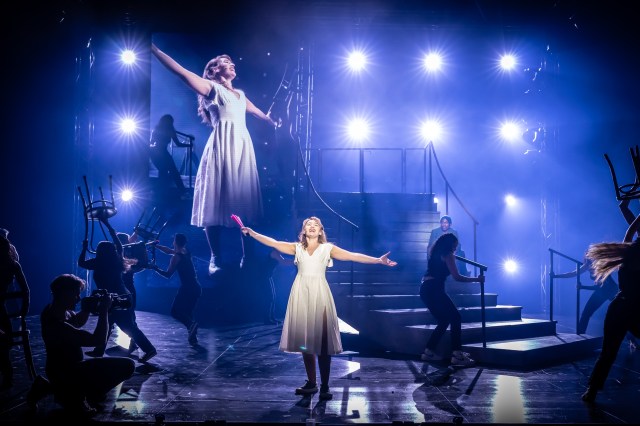
Curve’s auditorium is turned into an arena in their reimagined version of Evita. Like great rock icons at their defining concerts, our protagonists rise from beneath the stage to perform on a podium. Only later, the pedestal of Argentina’s first lady, Eva Perón, crushes the people that raised it up.
Blaring spotlights (lighting by Joshie Harriette) shine out over the crowd, bringing them in on the action. Side stage, the wings open out giving access all areas privileges to witness the inner-workings of the production. The ensemble fills the aisles with parroting chants of “Perón!” and erupting into cheers as they join the audience to watch declarations to the nation.
It appears to be the season for monochromatic Andrew Lloyd Webber revivals that feature on-stage camera operators documenting iconic musical theatre figures. In London, Sunset Boulevard sees Nicole Scherzinger’s take on a deranged Norma Desmond. In Leicester, Martha Kirby is a tough and polished Eva Perón – she is a diamond.
Nikolai Foster’s telling is a statement on the double-edged sword of power. Eva is first-and-foremost an influencer; experiencing the highs of adoring fandom and the lows of cancel culture. It lends a new perspective to the figure and Kirby’s take portrays an isolated woman; poised, cool, and controlled, with a painted-on smile.
Tyrone Huntley’s Che becomes an omnipresent narrator. In parts he’s a MC, thriving from the spectacle – hosting dystopian game shows and guiding time montages with wry handwritten signs that read simply ‘some time later’. He sets a fire alight from the off, turning “Oh What a Circus” into a cautionary tale and performing it as a protest song. Throughout, he climbs fire escapes and surveys Eva with a handheld camera that fills a tall screen at the back of the stage.
Whilst the camera-work isn’t always slick, and is in parts over-done, Eva flirts with the lens, eyeing it more than she does the audience. She maintains contact even when engaging in love affairs with indistinguishable ‘whoevers’ clad in uniformed black trousers and tees under a shadowed staircase. Like paparazzi in a relentless game of cat and mouse, the two use Michael Taylor’s playground of lift shafts and balconies as if they are stalking prey.
A rousing energy roars through the production, and numbers crash into each other at such breakneck speed, there’s no pause for applause. Magaldi (an underused Dan Partridge) is merely introduced with a hip thrust, and Chumisa Dornford-May’s “Another Suitcase in Another Hall” is beautiful but fleeting. Those unfamiliar with the show may struggle to fully understand the plot, but the action is enough to keep you gripped.
Despite the spartan set, nothing of Lloyd Webber and Tim Rice’s epic score has been stripped back. Under Ben Van Tienen’s direction, the orchestra swells with a sense of doomed romanticism. A chorus of voices, including young actors from the theatre’s community group, add echo and hope whilst they move as one in pulsing waves. Adam Murray’s cinematic choreography is well executed – a number with mirrors is simply spectacular – but like the rest of the production, there are few nods to Argentine culture.
The telling is less a biopic of a political figure in South America, and more a popular culture exposé about a cult icon – who is the talk of both eccentric garden parties and men’s locker rooms. Fascination is fed when Perón (a commanding, stern-faced Gary Milner, who stands tall and authoritative on a high balcony) is introduced and the power couple, united almost entirely in their ambition, don matching pinstripe suits as they rally for “A New Argentina” in a roof-raising act one closer. Edd Lindley’s designs are a beautiful homage to Eva’s signature style.
Like her performance, Kirby’s rendition of “Don’t Cry for Me Argentina” is understated but emotive. It’s the perfect reminder of how a person, like Eva Perón, and anthems, like that number, are remembered mostly through past accounts that are glamorously over-the-top. This Evita is proof that raw emotion cuts through the veneer of stardom and celebrity.















